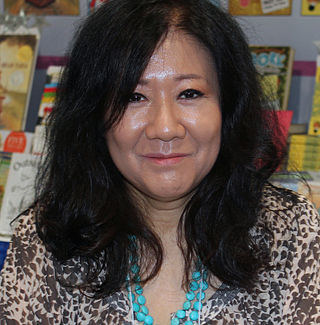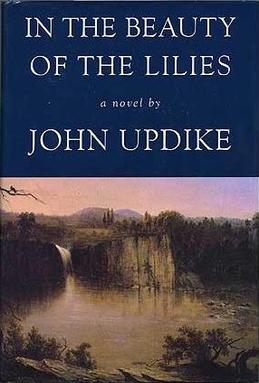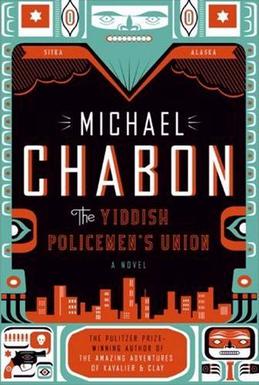
During World War II, the United States, by order of President Franklin D. Roosevelt, forcibly relocated and incarcerated at least 125,284 people of Japanese descent in 75 identified incarceration sites. Most lived on the Pacific Coast, in concentration camps in the western interior of the country. Approximately two-thirds of the inmates were United States citizens. These actions were initiated by Executive Order 9066 following Imperial Japan's attack on Pearl Harbor. Like many Americans at the time, the architects of the removal policy failed to distinguish between Japanese immigrants and Japanese Americans. Of the 127,000 Japanese Americans who were living in the continental United States at the time of the Pearl Harbor attack, 112,000 resided on the West Coast. About 80,000 were Nisei and Sansei. The rest were Issei immigrants born in Japan who were ineligible for U.S. citizenship under U.S. law.

The Poisonwood Bible (1998), by Barbara Kingsolver, is a best-selling novel about a missionary family, the Prices, who in 1959 move from the U.S. state of Georgia to the village of Kilanga in the Belgian Congo, close to the Kwilu River.

Cynthia Kadohata is a Japanese American children's writer best known for her young adult novel Kira-Kira which won the Newbery Medal in 2005. She won the National Book Award for Young People's Literature in 2013 for The Thing About Luck.

Toshio Mori was an American author, best known for being one of the earliest Japanese–American writers to publish a book of fiction.

Michiko Kakutani is an American writer and retired literary critic, best known for reviewing books for The New York Times from 1983 to 2017. In that role, she won the Pulitzer Prize for Criticism in 1998.
Yoshiko Uchida was an award-winning Japanese American writer of children's books based on aspects of Japanese and Japanese American history and culture. A series of books, starting with Journey to Topaz (1971) take place during the era of the mass removal and incarceration of Japanese Americans during WWII. She also authored an adult memoir centering on her and her family's wartime incarceration, a young adult version her life story, and a novel centering on a Japanese American family.
Kathryn Harrison is an American author. She has published seven novels, two memoirs, two collections of personal essays, a travelogue, two biographies, and a book of true crime. She reviews regularly for The New York Times Book Review. Her personal essays have been included in many anthologies and have appeared in Bookforum, Harper's Magazine, More Magazine, The New Yorker, O, The Oprah Magazine, and Vogue, Salon, and Nerve.

The Topaz War Relocation Center, also known as the Central Utah Relocation Center (Topaz) and briefly as the Abraham Relocation Center, was an American concentration camp in which Americans of Japanese descent and immigrants who had come to the United States from Japan, called Nikkei were incarcerated. President Franklin Roosevelt signed Executive Order 9066 in February 1942, ordering people of Japanese ancestry to be incarcerated in what were euphemistically called "relocation centers" like Topaz during World War II. Most of the people incarcerated at Topaz came from the Tanforan Assembly Center and previously lived in the San Francisco Bay Area. The camp was opened in September 1942 and closed in October 1945.

No-No Boy is a 1957 novel, and the only novel published by the Japanese American writer John Okada. It tells the story of a Japanese-American in the aftermath of the internment of Japanese Americans during World War II. Set in Seattle, Washington, in 1946, the novel is written in the voice of an omniscient narrator who frequently blends into the voice of the protagonist.

In the Beauty of the Lilies is a 1996 novel by John Updike. It takes its title from a line of the abolitionist song "The Battle Hymn of the Republic." The novel received the 1997 Ambassador Book Award for Fiction.

The Yiddish Policemen's Union is a 2007 novel by American author Michael Chabon. The novel is a detective story set in an alternative history version of the present day, based on the premise that during World War II, a temporary settlement for Jewish refugees was established in Sitka, Alaska, in 1941, and that the fledgling State of Israel was destroyed in 1948. The novel is set in Sitka, which it depicts as a large, Yiddish-speaking metropolis.
Mary McGarry Morris is an American novelist, short story author and playwright from New England. She uses its towns as settings for her works. In 1991, Michiko Kakutani of The New York Times described Morris as "one of the most skillful new writers at work in America today"; The Washington Post has described her as a "superb storyteller"; and The Miami Herald has called her "one of our finest American writers".
Hisaye Yamamoto was an American author known for the short story collection Seventeen Syllables and Other Stories, first published in 1988. Her work confronts issues of the Japanese immigrant experience in America, the disconnect between first and second-generation immigrants, as well as the difficult role of women in society.

Hotel on the Corner of Bitter and Sweet is a historical novel by Jamie Ford. The story is told in two parallel storylines, one following 12-year-old Henry Lee's experiences during the Second World War, and the other depicting Henry 44 years later as a widower with a college-aged son. The plot centers around the forced evacuation of Japanese Americans to internment camps; the book depicts the pain and trauma of separation through the friendship of the Chinese-American Henry and his Japanese-American friend Keiko.

Freedom is a 2010 novel by American author Jonathan Franzen. It was published by Farrar, Straus and Giroux. Freedom received general acclaim from book critics, was ranked one of the best books of 2010 by several publications, and called by some critics the "Great American Novel". In 2022, it was announced that Freedom would be adapted for television.
Nora Okja Keller is a Korean American author. Her 1997 breakthrough work of fiction, Comfort Woman, and her second book (2002), Fox Girl, focus on multigenerational trauma resulting from Korean women's experiences as sex slaves, euphemistically called comfort women, for Japanese and American troops during World War II and the ongoing Korean War.

The Buddha in the Attic is a 2011 novel written by American author Julie Otsuka about Japanese picture brides immigrating to America in the early 1900s. It is Otsuka's second novel. The novel was published in the United States in August 2011 by the publishing house Knopf Publishing Group.
Julie Otsuka is an American author.

The Age of Miracles is the debut novel by the American writer Karen Thompson Walker. It was published in June 2012 by Random House in the United States and Simon & Schuster in the United Kingdom. The book chronicles the fictional phenomenon of "slowing", in which one Earth day begins to stretch out and take longer and longer to complete. The novel received positive reviews and publishing deals totaling £1.12 million, and has been translated into a number of languages. The book was nominated as part of the Waterstones 11 literary award in 2012.

The Underground Railroad is a historical fiction novel by American author Colson Whitehead, published by Doubleday in 2016. The alternate history novel tells the story of Cora, a slave in the Antebellum South during the 19th century, who makes a bid for freedom from her Georgia plantation by following the Underground Railroad, which the novel depicts as a rail transport system with safe houses and secret routes. The book was a critical and commercial success, hitting the bestseller lists and winning several literary awards, including the Pulitzer Prize for Fiction, the National Book Award for Fiction, the Arthur C. Clarke Award, and the 2017 Andrew Carnegie Medal for Excellence. A TV miniseries adaptation, written and directed by Barry Jenkins, was released in May 2021.













